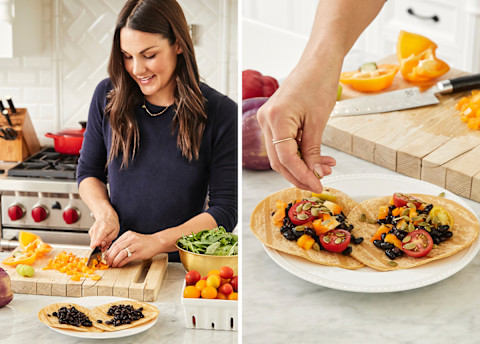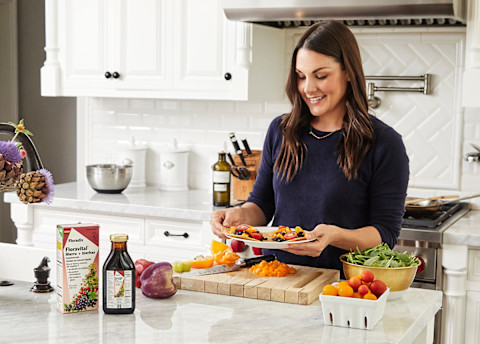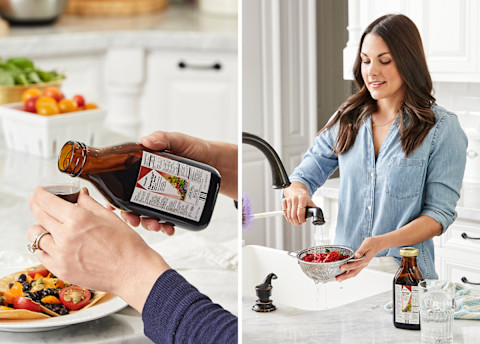Women Need Twice As Much Iron As Men. Here's How This Plant-Based Dietitian Gets Her Daily Dose

It's a common misconception that plant-based dieters don't get enough iron. The truth is many people—plant-based or otherwise—don't get enough iron. Iron deficiency is the most common nutrient deficiency1 in both adults and children. Rates are similar regardless of your dietary pattern.
In fact, I suffered from iron deficiency anemia when I was younger, years before I became a plant-based dietitian. I ate what I thought was a well-rounded diet, but I was also in my early 20s and working in entertainment; nutrition wasn't a high priority. To top it all off, I had been on PPIs since my teens.
I thought because I ate plenty of chicken, fish, and eggs that I didn't have to worry about iron. But when I went to the doctor complaining of extreme fatigue, I learned that wasn't the case.

I found out I had anemia, a condition that occurs when your body doesn't have enough iron to make hemoglobin. Luckily, it was easy to treat. I simply took Floravital® Iron + Herbs, a vegan liquid iron supplement that's gentle on digestion, until my levels improved. After that experience, I made iron consumption a priority in my diet.
I thought because I ate plenty of chicken, fish, and eggs that I didn’t have to worry about iron.
Other than making you feel too exhausted to think straight, iron deficiency can cause serious complications if left untreated—including heart failure. In pregnant women, iron deficiency can result in premature birth or very low birth weight. Because this deficiency is so common, it's important to know the risk factors. These include:

- Being a woman (lucky us). Because we lose blood during menstruation, the recommended daily allowance (RDA) of iron is more than double (18 mg) for women compared to men (8 mg).
- Being pregnant. Your blood volume doubles during pregnancy, meaning an increased need for this nutrient. Iron is a critical component of hemoglobin, the molecule that transports oxygen in our blood. Needs during pregnancy increase to 27 mg/day—which is a ton. Women who don't supplement are at a high risk of deficiency.
- Taking medications like proton-pump inhibitors. PPIs are one of the most commonly prescribed drugs, and they work by decreasing the stomach acid that is needed to help absorb many vitamins and minerals.
- Eating an imbalanced diet. Anyone who neglects to include iron-rich foods in their diet will be at an increased risk of deficiency. This means vegetarians who avoid meat, a major source of easily absorbed "heme" (animal-derived) iron, need to be more conscious than meat-eaters about meeting their needs and including iron-rich plants in their diet. But omnivores aren't immune.
How to increase iron's bioavailability in plant-based foods.

It turns out that, other than red meat, many animal foods aren't awesome sources of iron. Eggs, for example, contain 1 mg of iron, but they also contain a protein that inhibits iron absorption. So instead of adding burgers to my diet, I started upping my plant-based iron intake and getting smart about sources.
Iron is abundant in a plant-based diet; it's found in foods like whole grains, nuts, seeds, and legumes. While it is less bioavailable than heme-based iron, there are plenty of easy ways to increase its bioavailability.
- Add vitamin C. Ascorbic acid, aka vitamin C, can increase the absorption of iron from plants by four to six times. Include foods like strawberries, bell peppers, kale, and citrus with your iron-rich meals.
- Avoid absorption inhibitors. Certain foods and compounds can decrease iron absorption from plants. This includes coffee, tea, and calcium. Always take calcium supplements separately from meals, and avoid calcium-rich foods like milk and fortified milk with your iron-rich meals.
- Try sprouting, soaking, or fermenting. All of these processes increase the bioavailability of plant-based iron by decreasing iron inhibitors known as phytates. You can find many sprouted-grain products these days at the store as well.
I haven't had a problem with iron since, even throughout pregnancy and since going plant-based. I took iron supplements during my pregnancy (in addition to eating a well-balanced Predominantly Plant-Based Diet), and I continue to eat a nutritious diet. I don't even have to think about it now—it's become second nature to include iron and vitamin-C-rich foods in my daily diet.
While iron deficiency may be a common problem for women, it doesn't have to be. And you certainly don't have to eat a meat-heavy diet to prevent it!
The information in this article is the opinion of the author and/or individuals quoted and in no way reflects the policies or positions of Flora Health. This is not intended to be a substitute for professional medical or nutrition advice.
